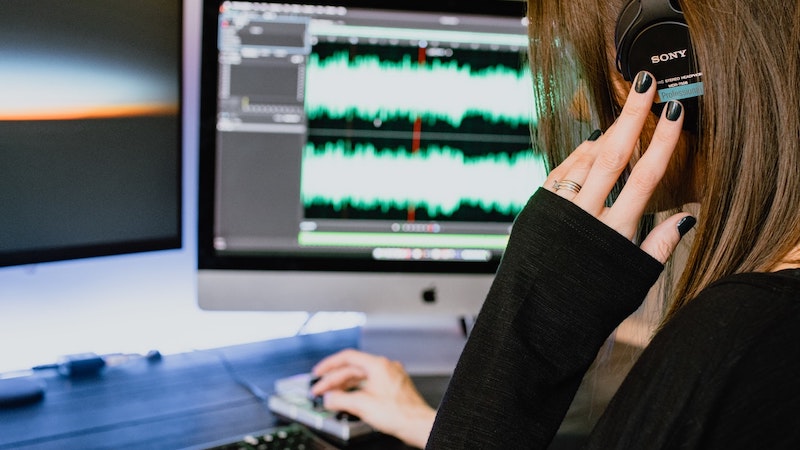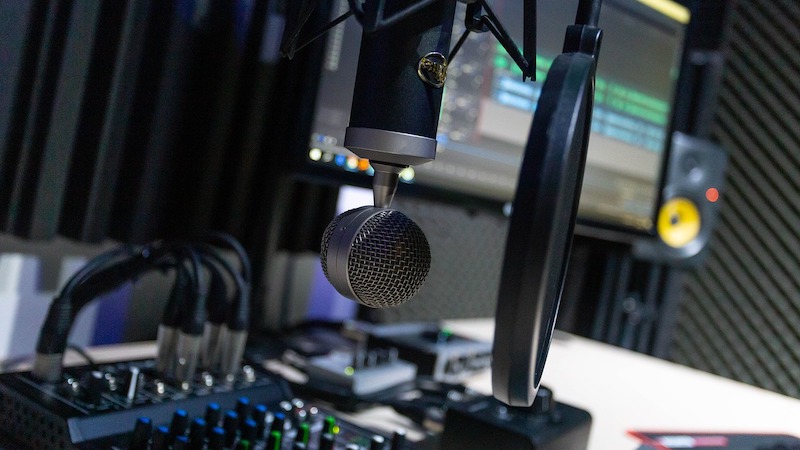The video editor for podcasters Get unlimited 15-second videos for free
Good reasons why your podcast absolutely needs subtitles
Podcasts are part of the marketing of many companies. The main ingredient is the audio, which is pre-recorded by one or more people on a specific topic. In this post, we'll explain why, in addition to audio, subtitles are a must for your podcast.
What are subtitles?
Subtitles are lines of text that reflect what is being said. Most often, they are used to translate spoken content from a foreign language or to present it for people with hearing impairments. They are also helpful for people who, for various reasons, are in situations where they can't listen to the audio content of a video at the time.
So, subtitles have different purposes and add value for different groups of people.
Who needs subtitles?
As mentioned above, subtitles are helpful for different groups of people. In the list below, we'll show you who is included:
- Deaf people cannot perceive audio content and so they need an alternative. Many deaf people can read text well. They can read the audio content as a transcript or subtitle.
- Hearing impaired people often prefer audio content as much as they can hear it. Subtitles help them understand what they cannot hear.
- The cause of hearing impairments can also be a central processing impairment. People with such an impairment generally prefer to use subtitles and transcripts.
- However, people without physical impairments also benefit from spoken content being more accessible. Subtitles help in noise-sensitive environments or when users are not yet proficient in the language of the video.
Why are subtitles so important in podcasts?
This question is easy to answer: do you want to do without some listeners, or would you like to instead provide them with a way to enjoy your podcast as well?
With the help of subtitles, you can make your podcast more accessible, since you can expand accessibility for people who are hard of hearing or deaf, for example. At the same time, you reach a broader audience.
In addition to people who rely on subtitles, there are different types of learners who absorb content better when they receive it in written form. Many non-native speakers of languages use podcasts to help them learn better and faster.
Subtitles can also be very helpful for those who are just on public transportation or other situations where they can't hear your podcast out loud.
Subtitles improve the search engine optimization (SEO) of your podcast
Using subtitles for your podcast will also improve your search engine optimization. This is because as soon as you bring up relevant content, keywords are naturally incorporated into the conversation.
So, incorporating high-quality subtitles is critical for increasing your online presence and visibility.
However, keep in mind that your keywords should not appear too often in your podcast and its subtitles because search engine algorithms will see it as lower quality. Check the frequency of the keywords at the end to make sure that you are still in the optimal range. When speaking, many people tend to repeat certain things.
Audiograms: The new way to market podcasts
Audiograms are images that are converted into video by layering various other elements, such as a waveform and transcripts. Basically, audiograms are a combination of visual art, sound waves, audio tracks, and text.
Collectively, you can also think of audiograms as trailers for podcast episodes. The combination of audio, video, image, and text grabs the viewer's attention much more than a simple link, plain text, or still image, so your post is more eye-catching.
Imagine someone scrolling through their social media newsfeed. While a user might scroll past a traditional link or even an image with text, audiograms are real attention magnets that are more likely to make the user pause and tune in.
The good thing is, you can embed audiograms on virtually any social media site, including Twitter, Facebook, YouTube, Instagram, and TikTok, making audiograms very versatile and effective.
If you're new to audiograms, take some time to experiment with different effects and elements to find out what works best for your audience. You can also test whether followers on different social media sites respond better to a certain type of audiogram. It is important to find out what works best for your audience.
There is no one-size-fits-all recipe for creating successful audiograms, since different things may work better for different audiences or podcasts.
Podcasts and social media: The most important combination
As mentioned earlier, users tend to watch a lot of social media videos on the go, and therefore, in silent mode. If you want to make sure that even viewers who have the sound turned off are aware of your podcast, be sure to add subtitles to the audiogram.
This way, first, viewers can tell that the audiogram is promoting audio content, and second, they can see what the content is about.
There will always be people who prefer video content over audio content, and vice versa. However, audiograms stand out on social media, so you'll most likely get some users to stop scrolling through their feeds and start watching your podcast and become fans.
And since audiograms are so easy to create these days thanks to tools like Audiocado, it's definitely worth giving them a try.
Include subtitles - easy with Audiocado
So you see, subtitles can play a big role for your podcast and are becoming more and more important for making your podcast successful. In order not to exclude any groups of people and to give everyone a way to consume your podcast no matter where they are, subtitles are necessary.
Audiocado, in addition to creating audiograms, now offers the ability to create subtitles. It's easy to do, it includes all the most popular languages to choose from, and you can get started right away.
Take the chance now to try out Audiocado completely free of charge and set up subtitles for your podcast.


